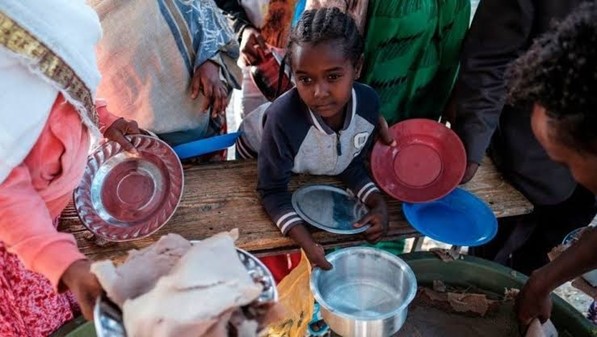Amnesty International Raises Concerns Over Famine Situation In Tigray
Humanitarian workers seek access as thousands are facing famine due to blockade by troops in Ethiopia.

Global rights group, Amnesty International, has expressed worries over the state of affairs in Tigray, Ethiopia, where government troops are not allowing aid workers access to conflict areas where many are in dire need of humanitarian assistance.
Humanitarian aid workers laid their concerns on Tuesday, 29 June 2021 over continued lack of humanitarian access for aid workers trying to deliver food, medical facilities and supplies to tens of thousands of people already suffering from famine in the Tigray region.
Troops in Tigray took back control of the region after a weeklong conflict that pushed back Ethiopian and Eritrean troops, humanitarian workers are reporting blockades at checkpoints throughout the region.
Last week, three aid workers employed by Doctors Without Borders were found dead in Tigray.
In early June, the UN said that at least 350,000 people in the conflict-ravaged region had entered a state of famine.
The U.S Agency for International Development (USAID) estimated that 900,000 people in Ethiopia’s Tigray region now face famine conditions.
Amnesty International said there are fears of reprisal attacks against civilians in Tigray by Ethiopian troops and their allies from the Amhara region of Ethiopia and from neighboring Eritrea.
Sarah Jackson, Amnesty International’s Deputy Regional Director for East Africa, said she remained concerned about atrocities being carried out as Ethiopian government forces retreated and Tigray’s regional forces re-established control.
“We call on all parties to prevent further massacres and conflict, by ensuring no reprisal attacks are carried out by their troops or militias under them,” Jackson said.
Antonio Guterres, UN Secretary General said he had spoken with Prime Minister Abiy Ahmed of Ethiopia on Monday and was hopeful that an effective cessation of hostilities towards the aid workers will take place in Tigray.
“It is essential that civilians are protected, humanitarian aid reaches the people in need and a political solution is found,” Guterres said on Twitter.
Support Our Journalism
There are millions of ordinary people affected by conflict in Africa whose stories are missing in the mainstream media. HumAngle is determined to tell those challenging and under-reported stories, hoping that the people impacted by these conflicts will find the safety and security they deserve.
To ensure that we continue to provide public service coverage, we have a small favour to ask you. We want you to be part of our journalistic endeavour by contributing a token to us.
Your donation will further promote a robust, free, and independent media.
Donate HereStay Closer To The Stories That Matter




